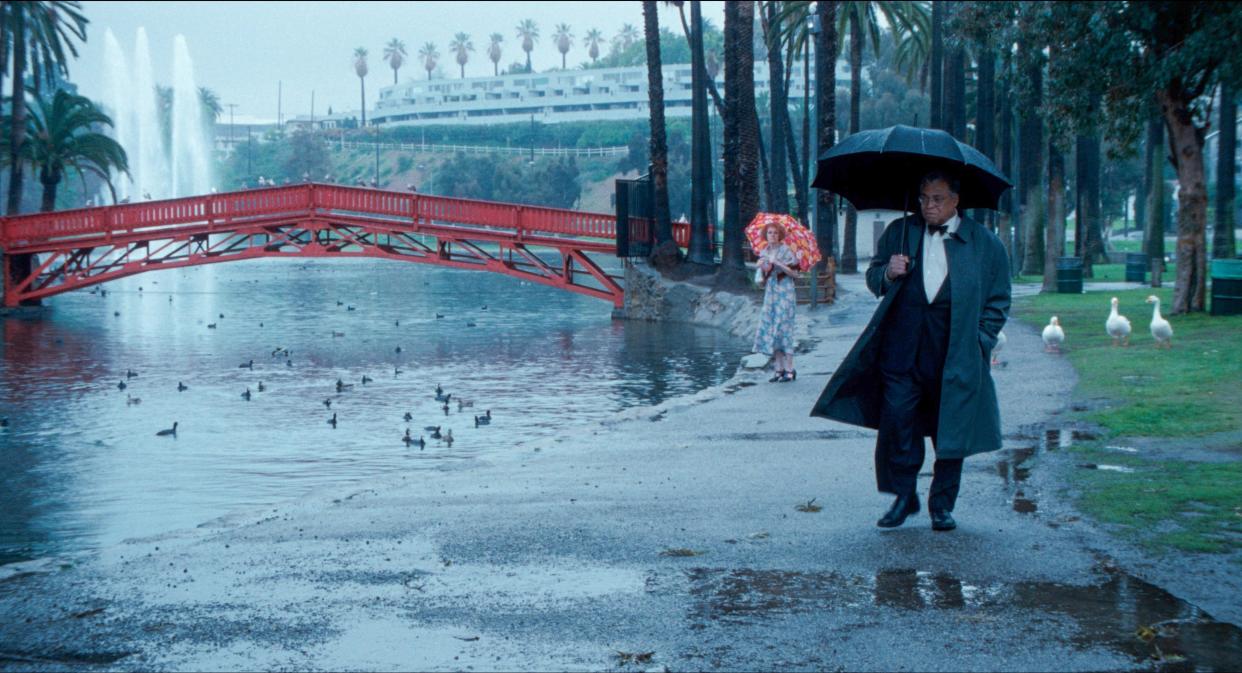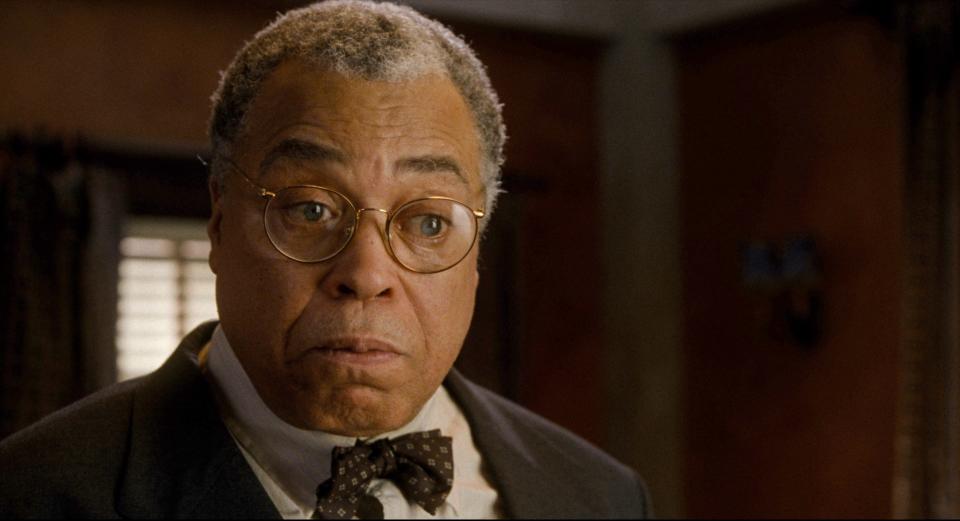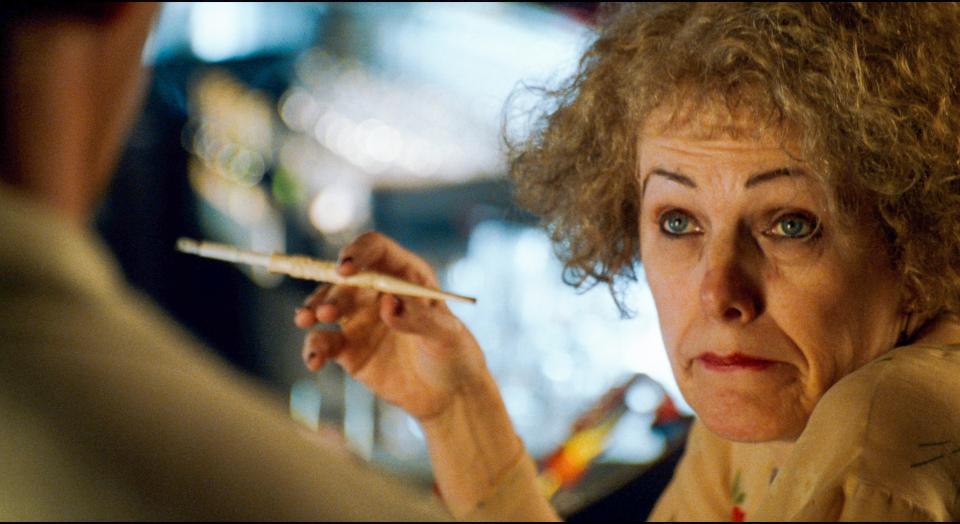Long-awaited 'premiere' of 'The Annihilation of Fish' with James Earl Jones set at the Wex

Whether you know him from his performances in “The Great White Hope” and “Field of Dreams” or as the voice of Darth Vader, James Earl Jones is unquestionably among the most formidable of living actors.
By the same token, Lynn Redgrave was her own sort of legend: The actress, who died in 2010, assured herself a place in cinema history with British New Wave classics such as “Georgy Girl.”
Twenty-five years ago, Jones and Redgrave co-starred in a humane and thought-provoking comedy-drama called “The Annihilation of Fish” — and it’s entirely likely that you’ve never heard of it.
Due to a mix of disinterest from potential distributors and legal problems on the part of financiers, the movie has barely been seen. Following its premiere at the Toronto Film Festival in September 1999, the movie was shown at a smattering of film festivals but never received theatrical distribution or a release on home video, TV or streaming platforms.
That will change next month at the Wexner Center for the Arts.
The movie, directed by the widely admired Black filmmaker Charles Burnett, will soon be given a wide release from independent-cinema distributor Milestone Films — a release to be launched with a kind of “second premiere” at the Wexner Center on March 2.
“The Annihilation of Fish” stars James Earl Jones as Obediah Fish, a Jamaican immigrant who imagines himself contending with the Devil, a mental state that has led to his being institutionalized as the film opens. Lynn Redgrave co-stars as Poinsettia, an opera aficionado whose own relationship to reality is equally debatable. Together, Obediah and Poinsettia form a bond both comical and emotionally affecting.
More: Chef Sebastian La Rocca of Fyr, a USA TODAY Restaurant of the Year, talks about his passion
The screening is part of the arts center’s annual “Cinema Revival” festival of restored and rediscovered films, taking place from Feb. 28 through March 4.
An accomplished director
In a recent interview with The Dispatch, Burnett expressed relief about the movie’s reemergence.
“You feel the weight is off your shoulders,” said Burnett, 79. “Now let’s see how it’s going to do — and that’s the next thing.”
For his stark yet poetic portrayals of contemporary Black life — including “Killer of Sheep” (1978), “To Sleep with Anger” (1990) and “The Glass Shield” (1994) — Burnett has won critical praise, a MacArthur Foundation fellowship and, in 2017, an Honorary Oscar from the Academy of Motion Picture Arts and Sciences.
“Charles Burnett is one of the finest filmmakers in this country,” Martin Scorsese said in a statement accompanying a press release announcing the release of “The Annihilation of Fish.” “His pictures speak in a cinematic voice that is uniquely and completely his own. For much too long, ‘The Annihilation of Fish’ has been in limbo.”

Yet such recognition does not necessarily make it any easier to get a movie off the ground.
“It’s hard to be an independent filmmaker,” said David Filipi, head of film/video at the Wexner Center. “It’s always this battle to put the money together to get a film made. . . . You’d think these people would just be able to walk into people’s offices and get a film made, but that’s not the business.”
A challenging project
In the case of “The Annihilation of Fish,” the road was especially rocky.
The film originated as a screenplay by Anthony C. Winkler that had been commissioned by producer Paul Heller, whose notable films included “Withnail & I” (1987) and “My Left Foot” (1989). Heller died in 2020.
“It took Paul Heller’s dedication and determination to make the film,” Burnett said. “He was set on doing it, and spent a lot of effort trying to get it going.”
Between 1990, when Winkler penned the earliest versions of the script, and 1999, when the film went before cameras, Heller tried and failed to find funding for the film, whose final budget was about $2.5 million. Potential cast members floated in and out, including Sidney Poitier as Obediah.
More: How will new Columbus Symphony music hall affect the Ohio Theatre, other arts groups?
“(Poitier’s) agent led us to believe that he did read (the script) and was going to do it, and then it sounded like he hadn’t read it,” Burnett said. “That really hurt us badly, because we had spent a lot of time trying to get him.”
Burnett stayed loyal to the project because he saw it as a welcome departure from his other movies.
“I hadn’t done comedy like this,” Burnett said. “That was a challenge.”

Finally, Heller secured financing from American Sterling Productions, headed by married couple Lawrence and Kristina Dodge. Although the producers were not filmmaking veterans — Lawrence Dodge ran the American Sterling Bank, among other things — Burnett remembers the shoot proceeding uneventfully.
“We had a good production team that made everything work out smoothly, so it wasn’t a strain or anything like that,” said Burnett, who singled out praise for his stars, James Earl Jones and Lynn Redgrave.
“He’s a big guy and has this deep of voice,” Burnett said of Jones. “He was just delightful to work with.”And, of Redgrave, Burnett said: “You couldn’t ask for a more cooperative person. She was going through some family issues and didn’t let it bother her. . . . She was a lady all the time.”
A doomed release
After its September 1999 premiere at the Toronto Film Festival, “The Annihilation of Fish” received an unambiguously, and unusually, negative review in the trade paper Variety.
This pronouncement, according to Burnett, hobbled its chances at being picked up by a distributor.
“It was the first time I had a review like that just killed everything,” he said.
In 2001, Regent Entertainment signed on for a limited release, but, following a fleeting “test run” of showings in Pittsburgh, the distributor bowed out.
The film might have been permanently unseen by the wider public had Burnett not, in 2002, contacted Dennis Doros, co-founder of Milestone Films (and distributor of other Burnett films).
“We really loved the film,” Doros said.
More: What is Leap Year and how can you celebrate? We offer 6 ideas
First, though, the rights had to be wrested from American Sterling Productions. Over more than a decade, Doros corresponded and negotiated with representatives from the company.
Then, in 2009, amid the Great Recession, American Sterling Bank failed — the first in a chain of events that affected other Dodge-owned companies, including American Sterling Productions. In the end, “The Annihilation of Fish” became part of a bankruptcy estate. Legal proceedings unfolded over years; Lawrence Dodge died in 2016.
Finally, in April 2021, Milestone acquired the rights through the court system to “The Annihilation of Fish” for an amount that Doros described as being “in the low five figures.”
A much-belated release
Following a restoration by the UCLA Film & Television Archive, “The Annihilation of Fish” will be shown for the first time in a 4K version at the Wexner Center on March 2, with Burnett in attendance. Milestone was happy to give the arts center the “premiere” screening of the movie.
The arts center has been booking Burnett’s films for decades: “Killer of Sheep” was first shown there in 1990, with numerous other screenings to follow. In 2017, Burnett visited the Wex for a screening, and in 2020, made a film for the institution’s “Cinetracts ’20” program of newly commissioned short films by leading directors.
Additional showings of “The Annihilation of Fish” are scheduled in Los Angeles and at the Cinematheque Francaise in Paris prior to worldwide theatrical distribution and, eventually, releases on DVD, Blu-ray and on streaming platforms.
Normally, Burnett does not like to look at his own films after they’re finished.
“It’s kind of scary to,” he said. “I come in to see if the first reel is OK, and then I’m off to the lobby.”
At the Wexner Center screening, though, he admits he’ll stay for the whole thing. He’s eager to see how audiences react to a movie made a quarter of a century ago.
“(The film) gives you a bit of insight into these people who are lonely and they find each other,” he said. “They’re able to survive by just having the presence of each other.”
At a glance
“The Annihilation of Fish” will be shown at 7 p.m. March 2 at the Wexner Center for the Arts, 1871 N. High St. Director Charles Burnett will appear in person. Tickets cost $9, or $7 for ages 55 and older and Wexner Center members, $5 for students. For more information, and a full “Cinema Revival” schedule, visit www.wexarts.org.
This article originally appeared on The Columbus Dispatch: 'The Annihilation of Fish' filmmaker to attend Columbus 'premiere'
